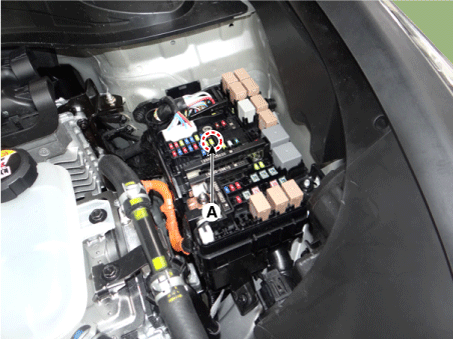Kia Niro: Fuel Delivery System / Release residual pressure in fuel line
| Release Residual Pressure in Fuel Line |
Whenever the high pressure fuel fuse, fuel pipe, delivery pipe, or injector is removed immediately after shutting off the engine, an injury may be caused by the release of highly pressurized fuel. Release the residual pressure in the high pressure fuel line by referring to the "Residual fuel pressure release procedure" below before removing any high pressure fuel system components. |
Wear safety glasses and fuel resistant gloves. |
| 1. |
Switch "OFF" the ignition and disconnect the negative (-) battery terminal. |
| 2. |
Remove the fuel pump fuse (A).
|
| 3. |
Reconnect the negative (-) battery terminal. |
| 4. |
Run the engine for about one minute to lower the pressure in the low pressure line. |
| 5. |
Switch "OFF" the engine. |
| 6. |
Disconnect the low pressure fuel line quick connector at the High Pressure Pump. Use rags to cover opening and catch spills while removing the fuel line. |
| 7. |
Start the engine and let it idle until the engine stops. At this point the pressure should be under 30 psi. |
| 8. |
Proceed with the service or repair. Use rags to cover opening and catch spills when opening up the high pressure system. |
| 9. |
Reinstall / re-connect all components in reverse order of removal. Start engine and confirm proper operation, and make sure there are no fuel leaks. |
| 10. |
After completing, clear DTC(s) using KDS/GDS scan tool (the procedure described above will cause DTC to set). |
 Fuel pressure test (low pressure system)
Fuel pressure test (low pressure system)
Fuel Pressure Test (Low
pressure system)
1.
Release the residual pressure in fuel line.
(Refer to the Fuel Delivery System - Inspection - "Release Residual Pre ...
 Fuel Tank Repair procedures
Fuel Tank Repair procedures
Removal
1.
Switch "OFF" the ignition and disconnect the negative (-) battery terminal.
2.
Remove the rear seat cushion.
(Refer to ...
Other information:
Kia Niro (DE HEV) Owners Manual: Notes on the safe use of the Tire Mobility Kit
Park your car at the side of the road so that you can work with the TMK
away from moving traffic. Place your warning triangle in a prominent place to
make passing vehicles aware of your location.
To be sure your vehicle will not move, even when you're on fairly level
ground, always ...
Kia Niro 2017 (DE HEV) Service Manual: Multimedia Jack Description and operation
Description
The multimedia jack on the console upper cover is for customers who like to listen
to external portable music players like the MP3 etc., through the vehicle's sound
system when it is linked to this jack. The customer has this added option.
In case of distorted soun ...



